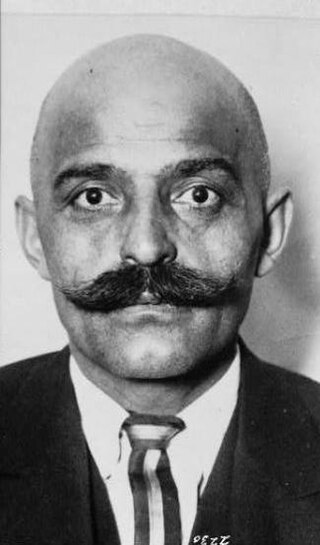
George Ivanovich Gurdjieff was a Greek–Armenian philosopher, mystic, spiritual teacher, composer, and movements teacher. Gurdjieff taught that people are not conscious of themselves and thus live their lives in a state of hypnotic "waking sleep", but that it is possible to awaken to a higher state of consciousness and serve our purpose as human beings. The practice of his teaching has become known as "The Work" and is additional to the ways of the Fakirs (Sufis), Monks and Yogis, so that his student P. D. Ouspensky referred to it as the "Fourth Way".

The Red House Mystery is a whodunnit by A. A. Milne, published in 1922. It was Milne's only mystery novel.
Pyotr Demianovich Ouspenskii was a Russian philosopher and esotericist known for his expositions of the early work of the Greek-Armenian teacher of esoteric doctrine George Gurdjieff. He met Gurdjieff in Moscow in 1915, and was associated with the ideas and practices originating with Gurdjieff from then on. He taught ideas and methods based in the Gurdjieff system for 25 years in England and the United States, although he separated from Gurdjieff personally in 1924, for reasons that are explained in the last chapter of his book In Search of the Miraculous.
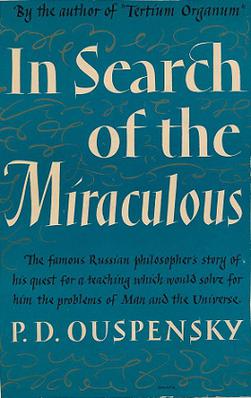
In Search of the Miraculous: Fragments of an Unknown Teaching is a 1949 book by Russian philosopher P. D. Ouspensky which recounts his meeting and subsequent association with George Gurdjieff.

Alfred Richard Orage was a British influential figure in socialist politics and modernist culture, now best known for editing the magazine The New Age before the First World War. While he was working as a schoolteacher in Leeds he pursued various interests, including Plato, the Independent Labour Party and theosophy. In 1900, he met Holbrook Jackson and three years later they co-founded the Leeds Arts Club, which became a centre of modernist culture in Britain. After 1924, Orage went to France to work with George Gurdjieff and was then sent to the United States by Gurdjieff to raise funds and lecture. He translated several of Gurdjieff's works.

The Unbearable Lightness of Being is a 1984 novel by Milan Kundera, about two women, two men, a dog, and their lives in the 1968 Prague Spring period of Czechoslovak history. Although written in 1982, the novel was not published until two years later, in a French translation. The same year, it was translated to English from Czech by Michael Henry Heim and excerpts of it were published in The New Yorker. The original Czech text was published the following year.
Eternal return is a philosophical concept which states that time repeats itself in an infinite loop, and that exactly the same events will continue to occur in exactly the same way, over and over again, for eternity.
James Charles Napier Webb was a Scottish historian and biographer. He was born in Edinburgh, and was educated at Harrow and Trinity College, Cambridge. He is remembered primarily for his books The Harmonious Circle, The Occult Underground, and The Occult Establishment.

George Holbrook Jackson was a British journalist, writer and publisher. He was recognised as one of the leading bibliophiles of his time.

Ladysmith is Giles Foden’s second novel. It was published in 1999 by Faber and Faber.

The Winter Room is a Newbery Honor-winning short novel by Gary Paulsen. It is a realistic fiction story about logging and farming, narrated in the first person to two boys by their Norwegian uncle in the "winter room" of a farm in northern Minnesota, United States. Like many of his works, it evokes a harsh rural environment using vivid imagery, and has elements of a coming of age tale.

Swallows and Amazons is a children's adventure novel by English author Arthur Ransome first published on 21 July 1930 by Jonathan Cape. Set in the summer of 1929 in the Lake District, the book introduces the main characters of John, Susan, Titty and Roger Walker (Swallows); as well as their mother, Mary; and their baby sister, Bridget. We also meet Nancy and Peggy Blackett (Amazons); their uncle Jim, commonly referred to as Captain Flint; and their widowed mother, Molly Blackett. It is the first book in the Swallows and Amazons series, followed by Swallowdale.

Darkwing is a 2007 young adult fantasy novel by Canadian author Kenneth Oppel. It is the prequel and fourth book of the Silverwing series, and takes place 65 million years before the events of the first book. It describes the origins of the war between the birds and the beasts.
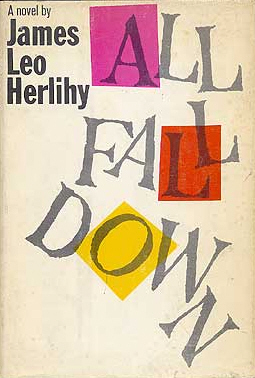
All Fall Down is a 1960 novel by James Leo Herlihy, which was adapted into a 1962 film of the same name directed by John Frankenheimer.
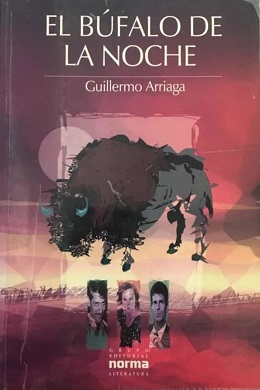
The Night Buffalo is a novel by Guillermo Arriaga.
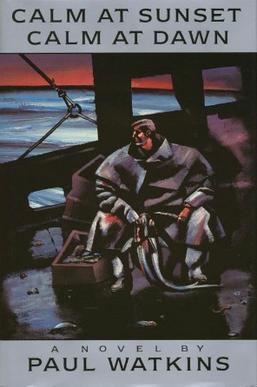
Calm at Sunset, Calm at Dawn is the second novel by American author Paul Watkins. It was published in 1989 by Houghton Mifflin and shared the Encore Award the following year.
I Have Been Here Before is a play by J. B. Priestley, first produced by Lewis Casson at the Royalty Theatre, London, on 22 September 1937.

Romauld Landau (1899–1974) was born in Poland but became a British citizen when he served as a volunteer in the Royal Air Force during the Second World War. He was a sculptor, author, educator, Foreign Service officer and specialist on Arab and Islamic culture. His particular area of interest was Morocco. He was also an art critic and book reviewer for several newspapers and periodicals, including The Spectator. He is buried in the Christian cemetery of Marrakesh, Morocco.

The Study Society is registered with the Charity Commission as Registered Charity Number 1155498. Its stated objects are for the public benefit:
- to advance the education of the public in religion, science, philosophy and the arts.
- the promotion of moral and spiritual welfare.

Robin Amis (1932–2014) was a British author, poet, publisher, editor and translator. Although he had studied a wide range of spiritual traditions, including Kabbalah, the Fourth Way and Hindu teachings, it was his conversion to the Eastern Orthodox Church and his relationship with Mount Athos, the ancient monastic republic in Greece, that ultimately defined his life and work. Over a thirty-year period, between 1982 and 2013, he made more than 60 visits to Mount Athos, where he was recognised as a "synergatis", a fellow worker and equal of the monks. Amis documented the results of his research in A Different Christianity: Early Christian Esotericism and Modern Thought, and recounted his experience on the Holy Mountain in Views from Mount Athos. As founder of Praxis Institute Press, he translated, edited and published the three-volume English language edition of Gnosis by Boris Mouravieff as well as books on Hesychasm and the spiritual tradition of Eastern Orthodoxy. He was married to the American artist Lillian Delevoryas and in the last years of his life lived in Bristol, England.
















